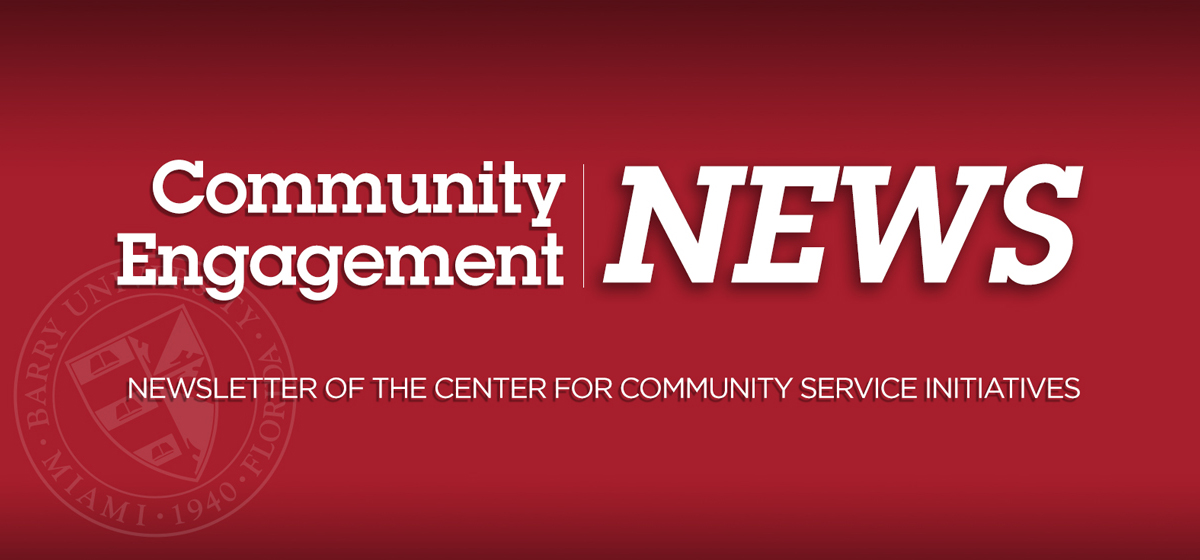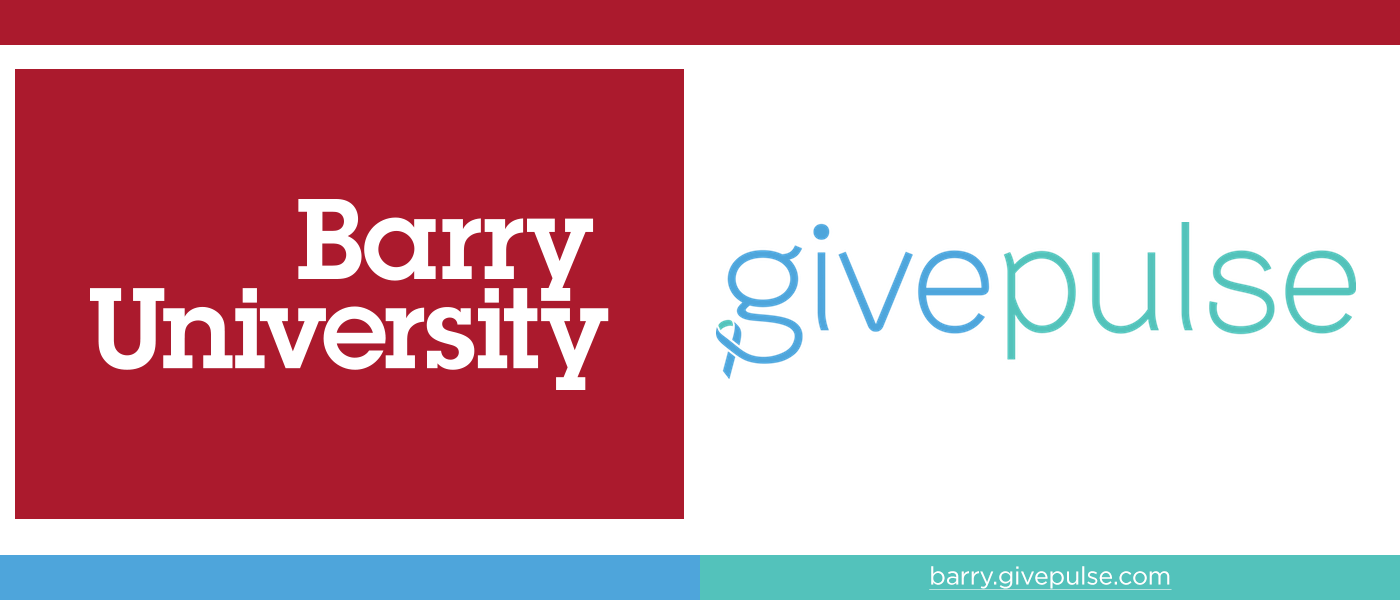June 1, 2021
IN THIS ISSUE
- Honors Students Focus on Social Justice in Light of the Coalition of Immokalee Workers’ Fair Food Program
- Barry Service Corps Members Make a Difference in the Community
- Social Innovation Course in School of Business Approved for Service-Learning Designation
Honors Students Focus on Social Justice in Light of the Coalition of Immokalee Workers’ Fair Food Program

Sustained efforts to protect human rights in the workplace and to promote social responsibility in U.S. agriculture have fired the imagination of students in Barry University’s Honors Program. The students have considered ways to help advance the work of the organization behind those efforts—the Coalition of Immokalee Workers (CIW).
During the spring semester, honors students taking Dimensions of Culture learned about the CIW’s work in combating farm-labor exploitation and in securing “fair food” agreements with multibillion-dollar food retailers. A Humanities class, Dimensions of Culture had “a well-designed service-learning project,” which required students to consider ways to contribute to the promotion of social justice in community settings.
It was through the service-learning project that the students became knowledgeable about the CIW’s human rights work. At the same time, they saw the opportunity to integrate elements of Barry’s mission and core commitments into their personal lives.
The students learned about Barry’s core commitments “in ways that will be very hard to forget,” said Dr. Pawena “Winnie” Sirimangkala, director of the Honors Program. She alluded to the commitments to social justice and collaborative service, which underpin Barry’s service-learning program.
“For starters,” Sirimangkala said, “none of the students will be eating their sandwiches without thinking about the migrant farmworkers across the U.S., especially Mr. Wilson, a CIW member, and Mr. Wilson’s fellow migrant workers.”
The CIW’s Fair Food Program and Campaign for Fair Food, as well as its Anti-Slavery Campaign, got students thinking deeply about human rights and social justice issues, especially those affecting farmworkers and their families.
Some students took copious notes as they listened to Uriel Zelaya-Perez, a CIW leader, emphasizing the power of community organizing.
“After learning about the CIW, I felt so privileged to have been born in an environment where I’ve never had to worry about fair working conditions,” one student said. “Although it saddened me, I recognized that my environment also allows me to speak for those who are not heard, like the CIW.”
The students made an in-class presentation on their service-learning project to Sister Linda Bevilacqua, O.P., Ph.D., and Sister Kathleen Nolan, O.P.
Barry’s president emerita, Sister Linda is the founding director of the Adrian Dominican Institute for Mission and Leadership. Sister Kathleen is director of the Adrian Dominican Sisters’ Office of Peace, Justice and Integrity of Creation. The presentation called attention to Barry’s involvement with the CIW and its Fair Food Program, which is aimed at getting fast-food and other companies to increase their pay to tomato farmers by 1 cent per pound of the fruit.
Strategies for Social Justice
The classroom discussion turned to various strategies to bring about social justice. When the students asked for an endorsement of the CIW’s boycott against Wendy’s—a company that has not signed on to the Fair Food Program—Sister Kathleen noted the harm that boycotts could bring to workers. According to her, “The way to go is through investment,” because shareholders have a voice in the policies of corporations. “Over time, this could accomplish what boycotts could not,” she said.
“I was so proud,” said Sister Linda of the honors students. “It warmed my heart. [The students] learned, they reflected on what they learned, and they decided their lives were not going to be the same after that. That’s what education is all about—transformation.
In an email to Center for Community Service Initiatives (CCSI) staff, Sirimangkala, the Honors Program director, commented: “It is fair to say that our HP students will be spending their summer thinking about what they can do, in their own walks of life, to continue making a difference.” She added that the students were expected to return in the fall “to pick up on their collaborative work with their HP fellows and faculty, in living their university’s core commitments.”
On behalf of the student leaders in the Honors Program, Sirimangkala thanked the CCSI for designing and facilitating the service-learning project.
The student leaders were Anna Galaktionov, Shanieya Harris, Jennie Iudice, Brianna Lopez, Walter MacWaters, Izabella Ruiz, and Mia Tubbs.
Barry Service Corps Members Make A Difference In The Community
Forty students participate in Federal Work-Study Community Service
During a challenging academic year in higher education, 40 Barry students participated in Federal Work-Study (FWS) Community Service. They supported the work of 10 community partners and the Center for Community Service Initiatives (CCSI).
Rebecca Cusani-David assisted 211 Miami with providing crisis counseling and community resources. As the number of calls to the confidential helpline increased dramatically, the student helped to provide 220 hours of additional coverage, assisting 880 clients, noted Tiffany Hernandez, quality assurance manager at Jewish Community Services of South Florida (JCS).
The main program of JCS Helpline Services, 211 Miami had a 24 percent increase in its annual call volume, Hernandez said. “211 Miami experienced a 150 percent increase in call volume during March and April of 2020,” she added. “We greatly appreciated Rebecca’s help to continue to serve our community and help those in need.”
As part of FWS Community Service, students served in such roles as helpline counselor, program assistant, marketing intern, language interpreter, and tutor/mentor.
All FWS Community Service participants are members of the Barry Service Corps (BSC), a civic learning and leadership development program primarily for undergraduates. In 2020–2021, the program required increased creativity and innovation because of the coronavirus (COVID-19) pandemic.
“Several students were able to return to their previous [service sites] … despite the challenges posed by the pandemic,” reported CCSI staff member Liz James, who coordinates the program. She explained that students provided most of their service virtually rather than as onsite projects.
Community partners praised the students for their service, their contributions to capacity building, and their express commitment to civic engagement.










Students supported the work of 10 community partners—A New Start: Financial and Social Services, Amor en Acción, South Florida People of Color, Breakthrough Miami, Branches, Peace Education Foundation, Easter Seals South Florida, Jewish Community Services of South Florida, Our Little Roses Foreign Mission Society, and W. J. Bryan Elementary School.
Lisette Barillas served with Our Little Roses Foreign Mission Society. “Because of her work and diligence, we were able to pivot quickly and efficiently during a time of organizational crisis,” said Ceciry Rodriguez, development and communications coordinator. “She provided thoughtful ideas that we were able to implement right away. We are so looking forward to welcoming her back in the fall!”
Meanwhile, Kenneth Garrett, senior site director at Breakthrough Miami, commended BSC member Nyoka Fowler on her beneficial service. “As a result of [her] work, we were able to enhance the communication between all of our constituencies. We were also able to carry out lessons seamlessly as our FWS student was able to mentor some of our new volunteers.”
Garrett added: “We also utilized our FWS student to give feedback early on in the year to review lesson plans that would be presented to scholars. Based on programming in the past, [her] feedback was vital in order to know what lessons to keep and which lessons didn’t work. From the feedback provided, we were able to adjust our curriculum and provide the scholars with a great virtual experience.”
The CCSI and the Barry Urban Garden were additional service sites for BSC members this academic year.
Social Innovation Course In School Of Business Approved For Service-Learning Designation
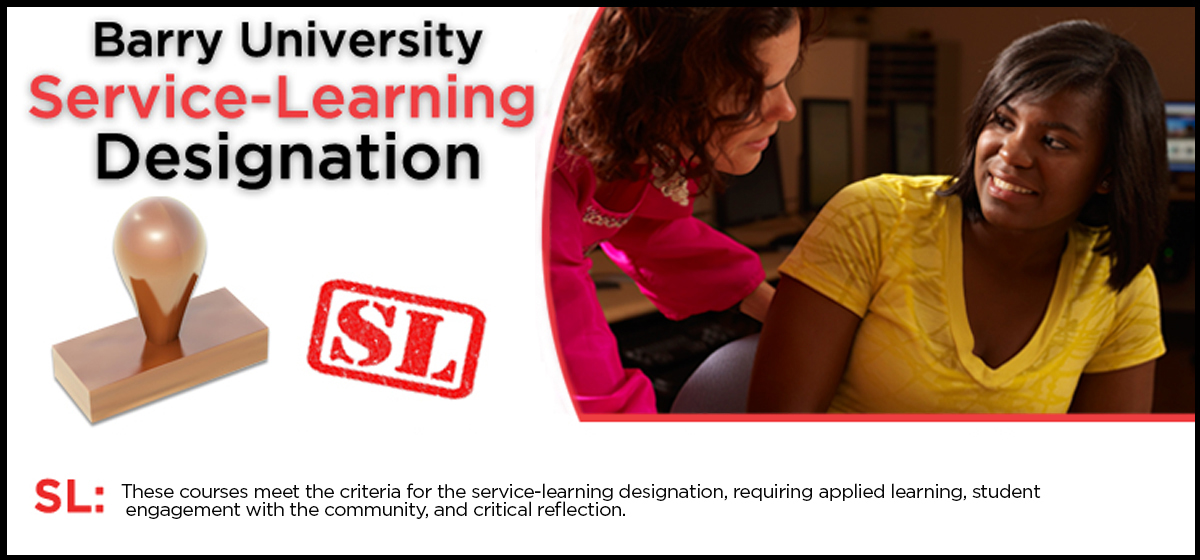

Service-learning courses such as MGT 428-01 demonstrate the value of applied learning, student engagement with the community, and critical reflection. Dr. Dale E. Hartz is the instructor for Social Innovation and Entrepreneurship.
Another course in the Andreas School of Business has been approved for the service-learning designation. The recent approval of Dr. Dale E. Hartz’s MGT 428-01: Social Innovation and Entrepreneurship for the designation means that four undergraduate business programs include this high-impact educational practice.
MGT 428-01 examines the nature of social impact innovation and entrepreneurship from the perspective of a startup (for-profit and nonprofit) as well as an established enterprise. Students engage with community clients—entrepreneurs, business owners, nonprofit organizational leaders, and others—and consider management, operations, marketing, and financial implications in the development and implementation of an action research project.
“Student learning is enhanced through real-world experiences,” Hartz explains in the syllabus. “It is intended that the students’ community-based client projects will make a positive organizational impact or solve a ‘problem of practice.’ Thus, it is expected that students will spend more than 10 hours to design/implement and complete their projects, which represents 35 percent of their course grade.”
In this management course, students are guided to apply business and entrepreneurship principles in a socially responsible way. The students are required to add entries to journals reflecting critically on their service and learning experiences.
Hartz is an assistant professor of management. He completed the Service-Learning Faculty Fellows Program during the 2019–2020 academic year.
The Andreas School of Business strives to develop in students “a strong sense of ethics, social responsibility, and an entrepreneurial attitude with a global perspective.” According to information at its website, the school is “committed to excellent teaching, engaged learning, and collaboration with our community.”
In addition to Management, the undergraduate business programs with designated service-learning courses are Accounting, Finance, and Marketing. ACC 362-01: Federal Income Tax is the first course in the School of Business to be approved for the SL designation. Approved in February 2014, the course is taught by Dr. Kevin Kemerer, associate professor of accounting.
Dr. Stephen Morrell’s FIN 356-01: Student Managed Investment Fund became designated as a service-learning course in November 2014. Morrell is professor of economy and finance.
Dr. Samuel Doss, associate professor of marketing, teaches MKT 326-01: Digital Marketing. The course received the SL designation in October 2019.
Applications for SL Designation
The CCSI is inviting faculty members whose courses include a service-learning component to apply for the service-learning designation.
Service-learning is a teaching and learning strategy that integrates meaningful community service with course work and critical reflection to enrich the learning experience, foster social responsibility and civic engagement, and strengthen communities. Designated SL courses demonstrate the value of applied learning, student engagement with the community, and critical reflection.
Sections of courses, internships, practicum assignments, field education, capstones, community-based research, and similar community-focused or community-based work may be designated as service-learning. Additional information and the application form are available at the CCSI website.
RACIAL HEALING INSTITUTE: The Association of American Colleges and Universities (AAC&U) has selected Barry University as one of 78 higher education institutions that will participate in the 2021 Institute on Truth, Racial Healing & Transformation (TRHT) Campus Centers.
COMMUNITY PARTNERSHIP AWARDS: During the CCSI’s first 10 years, 22 community partners won community engagement awards in the Community Partnership category. They will be listed in next week’s issue of Community Engagement News.
COMMUNITY ENGAGEMENT RESOURCES: The CCSI has assembled a variety of community engagement resources, which are available to both Barry campuses and community partners. Examples of books and journal articles will be included in a newsletter piece next week.
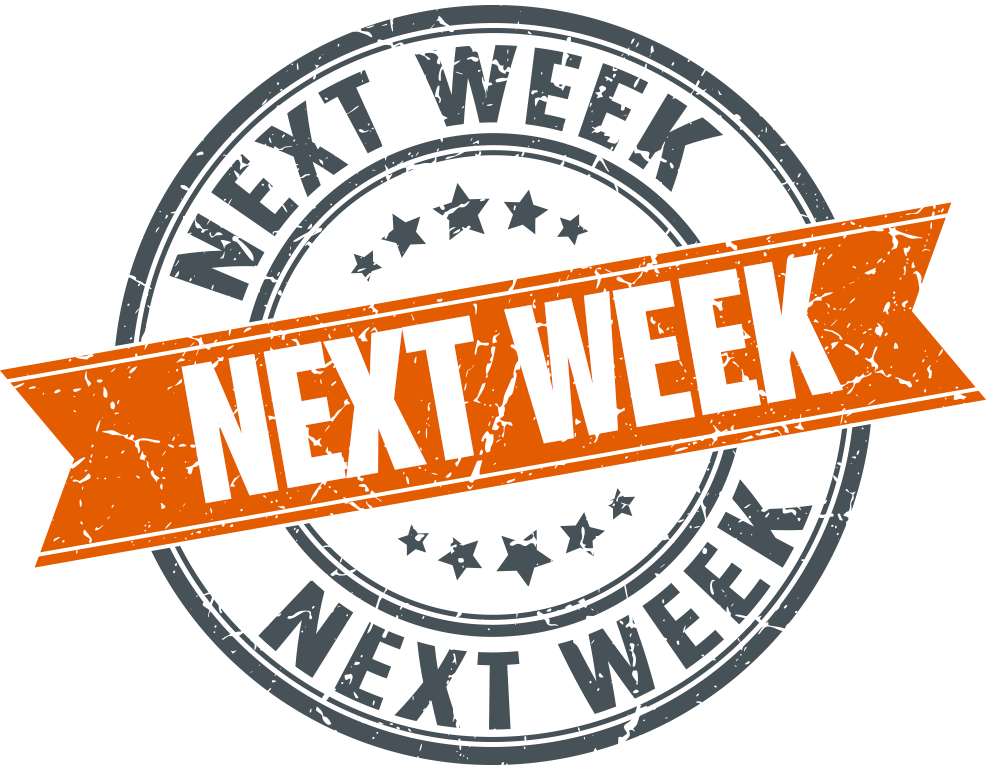
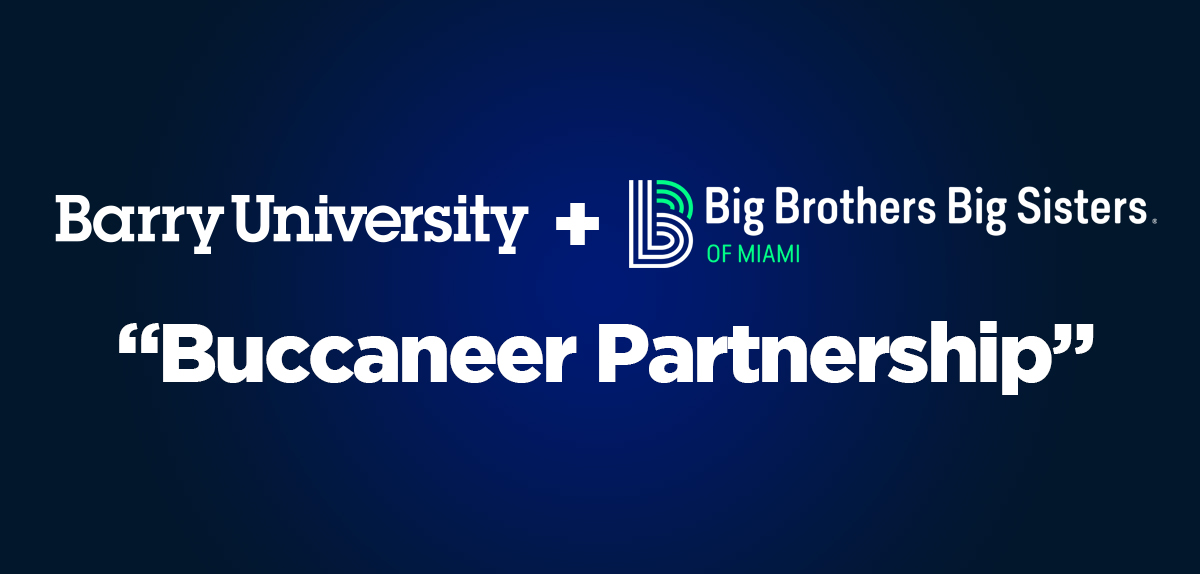
Apply to become a mentor (aka Big): https://bbbsmiami.org/volunteer/apply/
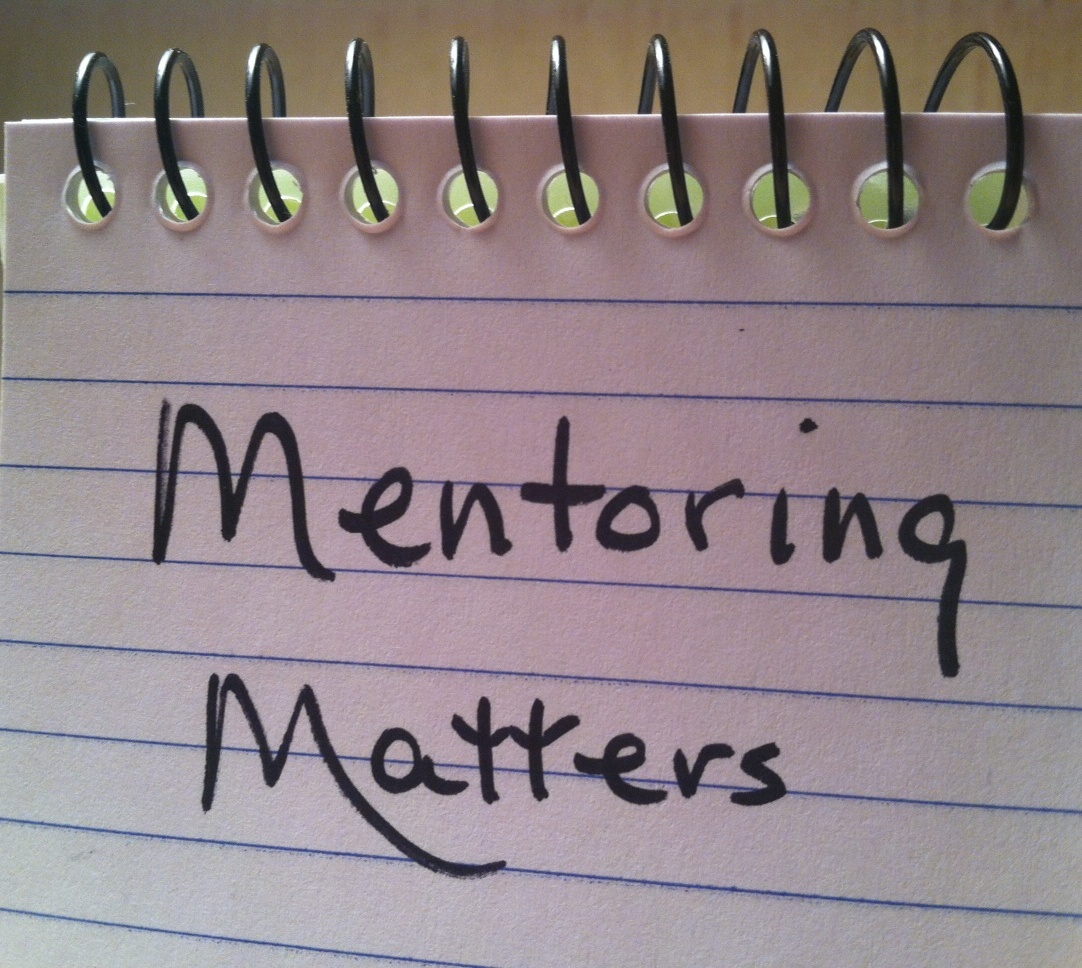

11300 NE 2nd Avenue
Adrian 208
Miami Shores, FL 33161

